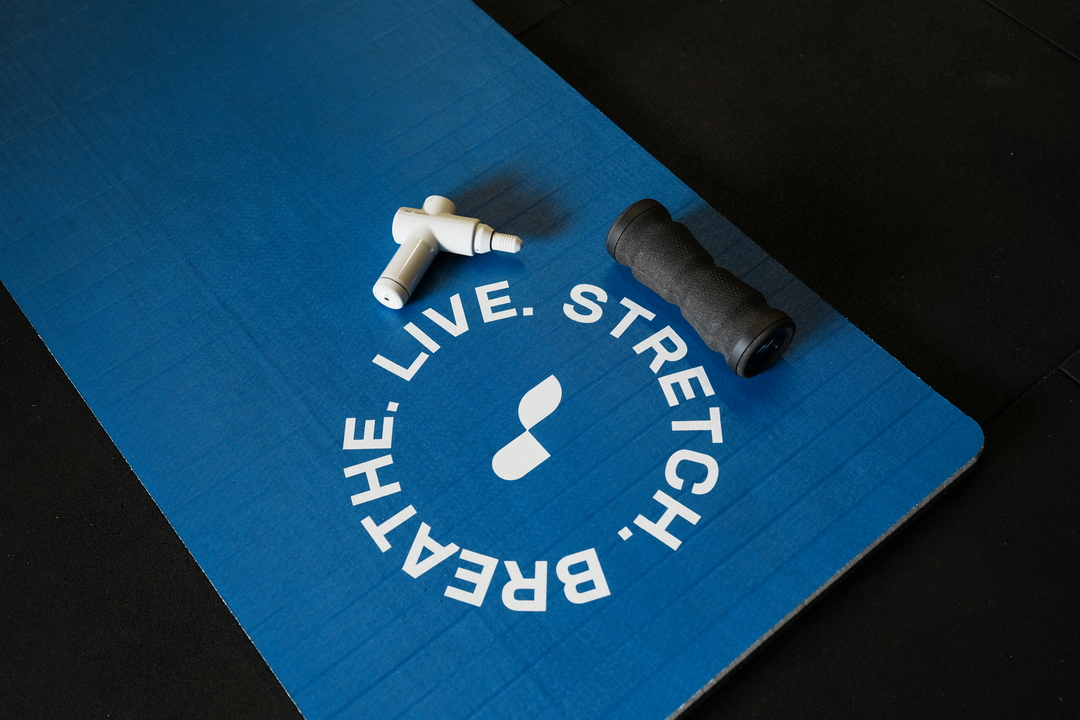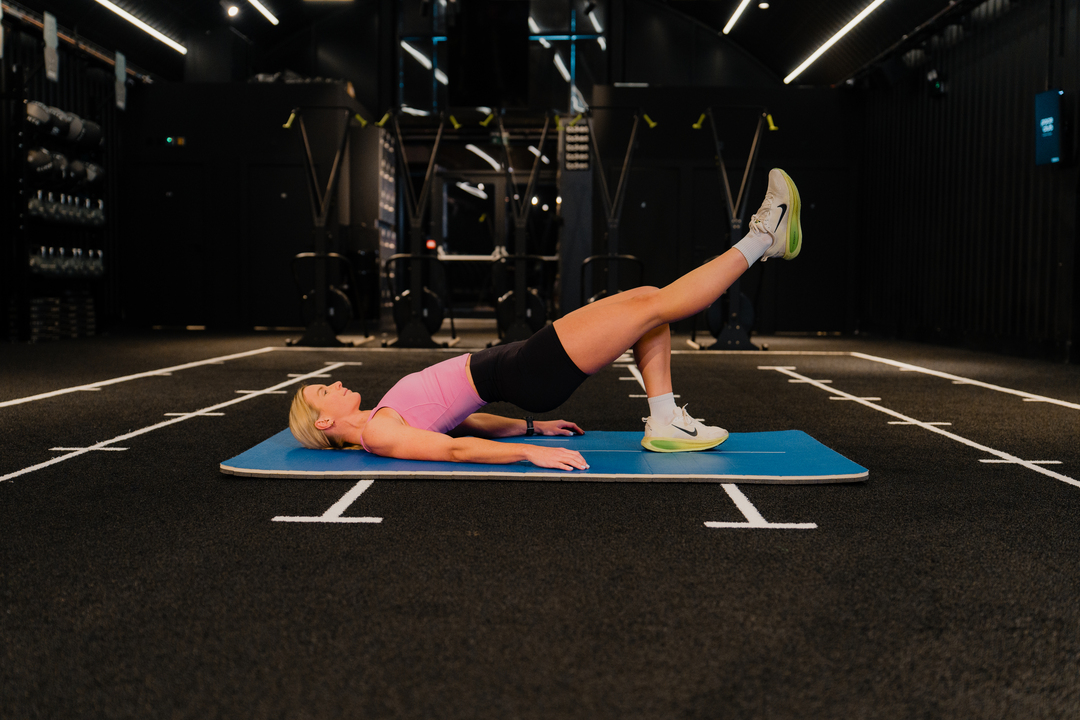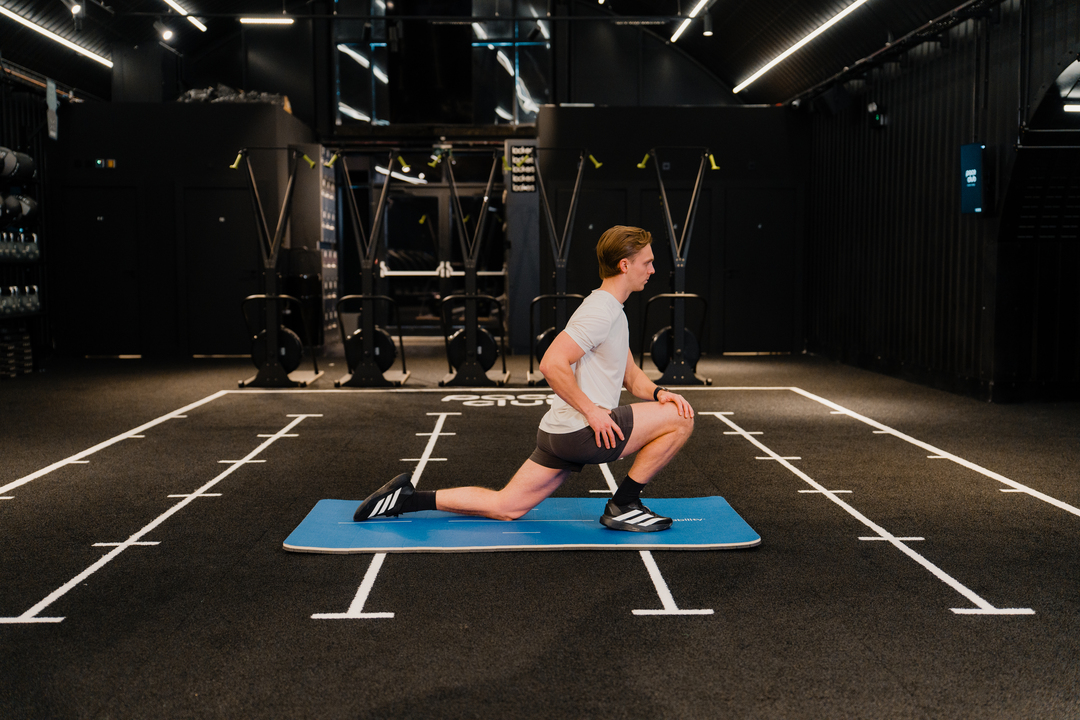After an intense workout, you might feel strong, but your muscles could be sore and need recovery. Promoting muscle recovery is key to optimizing your performance for your next workout. In addition to proper nutrition, using the best recovery tools for athletes—such as massage guns, compression gear, and foam rollers—can speed up recovery and reduce muscle fatigue. This article will focus on the best beverages for muscle recovery and explain how they can help you recover quickly, reduce muscle soreness, and optimize hydration to improve your performance and help you reach your fitness goals.
Pliability's mobility app is a valuable tool for achieving muscle recovery goals. It allows you to train harder, feel more substantial, and consistently progress toward your fitness objectives. The app offers customized programs to improve mobility and reduce soreness so you can return to your routine as quickly as possible.
What Exactly is Muscle Recovery?

Muscle recovery is your body's way of fixing the wear and tear caused by exercise. When you work out, whether lifting weights, running, or even yoga, you stress your muscles.
Tiny fibers in your muscles tear during these activities (don't worry—that's a good thing). Once the workout is over, your body gets to work repairing those micro-tears, making your muscles more potent and resilient.
How Workouts Stress Your Body
All workouts, especially tough ones, stress the body. Working out fatiguing or tiring out various muscles causes microscopic damage to muscle cells.
Chris Kolba, PhD, a physical therapist at the Ohio State University Wexner Medical Center in Columbus, explains that hormone and enzyme levels fluctuate, increasing inflammation.
Why Exercise Recovery Matters
The changes you're causing can do your body a lot of good. They lead to muscle growth, fat loss, improved insulin sensitivity, reduced inflammation, better cardiovascular health, and an overall healthier body. But you need to give your body time for those good changes to happen before you start stressing it out again.
"This rest, called exercise recovery, is what allows people to [benefit] from their workouts," Dr. Kolba says, "allowing you to get the maximum benefit from every exercise session."
The Physiology of Muscle Recovery
The damage that exercise causes triggers your body's immune system to repair that damage explains Adam Rivadeneyra, MD, a sports medicine physician with the Hoag Orthopedic Institute and the Orthopaedic Specialty Institute in Orange, California.
When your body's tissues, from your muscles and bones to your heart and lungs, recover, they become slightly fitter. That way, the next time you perform the same workout, you won't suffer as much damage.
The Power of Rest in Fitness
"But you have to cause some damage to your body for it to adapt," Dr. Rivadeneyra says. Repeated repeatedly, this process of stress and recovery results in improved health and fitness. Just don't skimp on the rest and recovery part.
Rest helps reenergize the body so you have the stamina to give it your all during your next workout, says Melissa Leber, MD, an orthopedic surgeon at Mount Sinai Hospital in New York City. You can't push it to your maximum without giving your body time to recoup in between, which is overtraining.
What Happens When You Don't Allow Enough Recovery Time?
"Overtraining can lead to overuse, which can lead to burnout and injury," Dr. Leber explains. Common overuse injuries include:
- Iliotibial band syndrome
- Stress fractures
- Patellofemoral syndrome (runner's knee)
- Muscle strains
What's more, research suggests inadequate rest and recovery can contribute to poor immune function, neurological changes, hormonal disturbances, and depression. That's why things like rest, hydration, nutrition, and sometimes recovery drinks play a big part in helping your body bounce back after a tough session.
Related Reading
- What Is Active Recovery
- Why Is Recovery Important for Athletes
- Is Yoga Active Recovery
- Should You Be Sore After Every Workout
- Calves Sore After Running
- Which Muscles Recover the Fastest
- Why Are Ice Baths Good for Muscle Recovery
- What to Do on Recovery Days
- Why Is It Important to Include Recovery Time in a Workout Program?
What to Drink for Muscle Recovery & Faster Post-Workout Healing

Hydration and nutrition both play key roles in muscle recovery after exercise. When you exercise, especially at high intensities or for prolonged periods, your body uses stored glycogen for energy and breaks down muscle protein. This process depletes your muscles of essential nutrients and fluids, which you need to replenish for optimal recovery.
Rehydrating helps restore fluid balance and can minimize muscle cramps. Nutrition helps repair the muscle damage caused by exercise and restores glycogen levels. Eating and drinking the right things after exercise can improve recovery, reduce muscle soreness, and help you perform better in future workouts.
What are Muscle Recovery Drinks?
Muscle recovery drinks are those post-workout beverages you see everywhere, designed to help your body bounce back after physical activity. They come in protein shakes, electrolyte blends, smoothies, and even shots. So, what’s in them, and what makes them “recovery” drinks? These drinks typically contain ingredients to support muscle repair, rehydrate, and replenish your energy levels.
You’ll often find protein (to rebuild muscle), carbs (to restore glycogen levels), electrolytes (to rehydrate), and sometimes soothing agents like ginger or turmeric to help calm soreness. These foods are marketed as a quick and easy way to give your body the nutrients it needs to recover faster, especially when you don’t have time for a meal.
Do Muscle Recovery Drinks Work?
Do muscle recovery drinks do what they claim? The answer isn’t as straightforward as “yes” or “no.” It depends on the drink, the ingredients, and how well it fits into your overall recovery routine. Protein shakes, for example, can be pretty effective in helping your muscles repair and grow, especially if you're not getting enough protein through your regular meals.
Choosing the Right Recovery Drink
Electrolyte drinks? Great if you’ve been sweating buckets and need to replace what you’ve lost. But some of those fancy recovery blends with long ingredient lists and bold promises? They might not always live up to the hype, especially if they’re loaded with sugar or fillers that don’t help your body recover.
The key is understanding what your body needs after a workout and choosing drinks with the right ingredients. Not all recovery drinks are created equal, and sometimes real food, hydration, and a little rest can do the trick just as well.
What About Recovery Shots?
When it comes to muscle recovery, you’ve probably seen or heard about recovery shots, those little bottles packed with potent ingredients.
Unlike your typical protein shake or electrolyte drink, shots are designed to deliver concentrated doses of key nutrients and compounds in just a couple of gulps. They’re quick and convenient and can be an excellent option for people who don’t want to fuss with mixing powders or blending smoothies.
What about Sports Drinks?
You see professional athletes chugging Gatorade during games. So, it must be an excellent post-workout drink. Not exactly. Sports drinks are functional beverages intended to replace carbs and electrolytes, such as sodium, potassium, and calcium, lost during exercise.
This loss generally occurs when excessive sweating occurs during high-intensity workouts lasting two or more hours. So most people with low- to moderate-intensity exercise don’t need sports drinks. These water-based beverages contain salt and sugar, which may be helpful to runners during marathons but may not be optimal for most post-workout recoveries.
When & What to Drink Post-Workout
Consuming your post-workout drink is almost as important as what you drink. After a hard workout, there are two nutritional windows during which you can maximize recovery and repair and help your body recover as quickly as possible.
Immediately Post-Workout
This period is the first nutritional window (also called the anabolic window). To help nourish, repair, and optimize your muscles, try to consume your post-workout drink (or snack) within 45 minutes of a workout.
A 12-week strength training study showed that consuming a carb-protein mixture immediately after a workout led to an 8% muscle size increase and a 15% strength improvement. Even so, when taken two hours later, no muscle growth or strength gain occurred.
- Carbs: Help replace muscle glycogen and stimulate insulin release, a key hormone in muscle building and repair.
- Protein: Enhances muscle building and refueling by increasing blood levels of amino acids and insulin, which help reduce muscle breakdown.
Reduces Muscle Soreness
A post-workout carb-protein drink can help decrease soreness, reduce injuries, and improve overall health. In a 54-day study involving marine recruits, the participants either received a non-caloric placebo, a carbohydrate-fat mixture, or a supplement of carbs and protein after their daily training sessions.
The researchers reported that the carb-protein group experienced superior muscle recovery and had, on average, 37% fewer muscle and joint injuries. These marines also had, on average, 33% fewer medical visits, 28% fewer bacterial and viral infections, 83% fewer cases of heat exhaustion, and significantly less muscle soreness after exercising.
Increases Performance
A protein-carb recovery drink may increase performance and reduce muscle damage. In one study, cyclists completed a stationary ride to exhaustion while consuming either a drink containing a 4:1 ratio of carbs to protein or a carb-only sports drink.
The next day, they repeated the same workout but at a higher intensity without drinking anything. Those given the carb-protein drink cycled 29% longer on the first day and 40% longer on the following day than those who consumed the carbohydrate-only mixture.
Carb-Protein Drinks Reduce Muscle Damage
Moreover, before starting the second workout, a blood sample was collected to measure concentrations of creatine phosphokinase (CPK), a marker of muscle damage. The scientists reported that the carb-protein drink reduced CPK levels by 83%, indicating less muscle damage.
Concerning muscle damage, consuming a carbohydrate-protein post-workout drink after an anaerobic workout (e.g., weight lifting, HIIT) will decrease muscle damage significantly more than conventional drinks.
2 Hours Post-Workout
The next nutritional window is longer – 1 to 3 hours after a prolonged workout. During this window, choose a meal or drink (about 150kcal) that includes:
- Carbs
- Protein
- Some healthy fats
You could make a green smoothie with any leafy green, nuts, or grated coconut for fats and protein and a banana for potassium and carbs. Instead of using water, try some chilled, raw coconut water. Opt for a healthy and balanced meal or snack during this post-workout window.
Related Reading
- Natural Muscle Recovery
- Is Sauna Good for Muscle Recovery
- Is Swimming Good for Recovery
- Benefits of Active Recovery
- How to Speed Up Muscle Recovery
- How to Get Rid of Sore Muscles Overnight
- Should You Workout When Sore
- Active Recovery vs Rest Day
- Active vs Passive Recovery
- How to Speed Up Muscle Strain Recovery
- Muscle Recovery Time by Age
- Recovery Methods for Athletes
5 Postworkout Drinks to Help You Recover Faster

1. Have a Glass of Plain Ole Water
Water is the go-to drink after a workout. It rehydrates the body after exercise, especially if the training session is less intense. A straightforward glass of H20 helps replenish lost fluids without extra calories or sugar.
Water's Role in Recovery
Water controls your body temperature and lubricates your joints. It also helps remove toxins from your body, including those that may build up during exercise. Finally, it balances electrolytes so your cells function optimally.
If plain water seems too bland, add a squeeze of citrus or some fresh fruit to boost flavor and nutrient content.
2. Drink Your Milk
Remember that old advertising campaign based around the phrase:
- “Milk. It does a body good”?
Milk does good for the body, especially after exercise. In one study, milk topped the list of the most hydrating drinks.
The researchers concluded this was partly due to the beverage’s higher calorie content. They found that higher-calorie drinks emptied more slowly from the stomach, allowing participants to stay hydrated longer.
Milk for Recovery and Hydration
Another study found that drinking cow’s milk after exercise may reduce post-workout soreness, help increase muscle mass, and support weight management.
Milk also replaces essential electrolytes—like potassium and sodium—that you lose through sweat. Electrolytes help regulate fluid balance in the cells for optimal hydration.
A Complete Post-Workout Drink
Milk contains protein and carbohydrates, two macronutrients your body needs to repair muscle damage and replenish energy stores after a workout.
If you’re drinking plain water after exercise, you’ll need to get those nutrients through food. Milk provides hydration and crucial macros in one glass. If you want to limit or avoid dairy products, try plant-based milk, such as:
- Almond
- Oak
- Coconut milk
Healthy Chocolate Milk for Recovery
If you don’t like it plain, you can try chocolate milk. Mix some raw cocoa powder with your milk, and you’ll get a dose of antioxidants and electrolyte minerals. But don’t drink store-bought, flavoured milk or chocolate milk mixes. They’re packed with sugar and other ingredients you should avoid in excess. Try a teaspoon of agave or sugar if you need a little sweetness.
3. Cheers to Tart Cherry Juice
Tart cherry juice isn’t as easy as milk or water. But it might be worth looking around for. Tart cherry juice contains a powerful blend of antioxidants and other anti-inflammatory ingredients.
Tart Cherry Juice for Muscle Recovery
For example, it’s a rich source of flavonoids and anthocyanins, plant substances that help against muscle damage and reduce inflammation. These ingredients explain why drinking tart cherry juice before and after exercise may reduce muscle pain and speed recovery.
But be aware that tart cherry juice can be high in sugar. So try not to drink more than 8 oz per day. Sour cherry is also available in supplement form for a lower-sugar option.
4. Enjoy a Nice Cup of Tea
Green and black teas are rich in antioxidant compounds that can replenish energy and restore muscles after exercise. Both teas are rich in polyphenols, which work against oxidative stress, contributing to disease, muscle damage, and inflammation.
Note that green and black tea contain caffeine, which can have a diuretic effect. So, limit your daily intake to three 80-oz servings (300 mg caffeine). Caffeine can also interfere with sleep, so avoid drinking it too late in the day.
Better Tea Choices for Recovery
Be selective with the teas you choose. Many store-bought tea drinks contain just a little tea and a lot of sugar. Try brewing your tea at home with fresh leaves.
If you don’t fancy a hot beverage after your sweaty workout, brew an extra-strong batch and drink it over ice. Add some mint sprigs or fresh fruit for extra flavor and nutrients.
5. Whip Up a Smoothie
Smoothies can be the ultimate post-workout refreshment if they’re made with healthy ingredients. Skip store-bought smoothies and make your own, adding proven recovery-boosting ingredients, such as:
- Coconut water: a perfect liquid base and a rich source of electrolyte minerals
- Peanut or almond butter: sources of a healthy dose of protein
- Milk or yogurt: good sources of protein, carbs, and electrolytes
- Antioxidant-rich berries: strawberries, blueberries, blackberries, and raspberries
- Pineapple: a source of bromelain, which can reduce muscle damage and inflammation after exercise
- Nutrient-rich greens: spinach, kale, and other leafy powerhouses
You can easily customize smoothies to your needs, whether you’re a runner who needs extra carbs or a powerlifter who needs additional protein.
Related Reading
- Which Magnesium Is Best for Muscle Recovery
- Hot or Cold Bath for Muscle Recovery
- Benefits of Massage Gun
- Foam Roller Benefits
- Chocolate Milk for Muscle Recovery
- How to Speed Up Muscle Strain Recovery in Back
- Causes of Poor Muscle Recovery
- Active Recovery Workout
- Active Recovery Stretches
- Best Recovery Tools for Runners
- Best Vitamins for Muscle Recovery
- Best Foods for Muscle Recovery
- Workout Recovery Tools
Improve Your Flexibility with Our Mobility App Today | Get 7 Days for Free on Any Platform
Pliability offers a fresh take on yoga tailored for performance-oriented individuals and athletes. Our app features a vast library of high-quality videos designed to improve flexibility, aid recovery, reduce pain, and enhance range of motion. Pliability provides daily-updated custom mobility programs for those interested in optimising their health and fitness.
It also includes a unique body-scanning feature to pinpoint mobility issues. If you're feeling limited by pain or your ability to move, Pliability aims to complement your fitness routine and help you move better.
Sign up today for 7 days free on iPhone, iPad, Android, or our website to use our mobility app to improve flexibility, aid recovery, reduce pain, and enhance range of motion.








